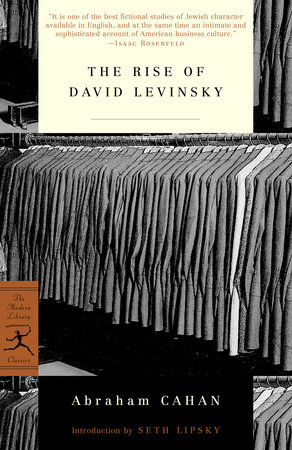The Rise of David Levinsky Reader’s Guide
By Abraham Cahan


1. The novel opens with David Levinsky?s declaration that ?the metamorphosis I have gone through strikes me as nothing short of a miracle.? What motivates the narrator?s transformation from devoted Talmudic scholar to passionate student to his final incarnation as a driven businessman? What additional themes contribute to Levinsky?s dramatic metamorphosis?
2. How would you characterize the differences between the Orthodox Jews and westernized Jews of Antomir? Later, when the story moves to America, how does Cahan contrast Eastern European Jews with German Jews? And what may be gleaned from Cahan?s depiction of the relationship between turn-of-the-century Jews and gentiles?
3. ?The United States lured me not merely as a land of milk and honey, but also, and perhaps chiefly, as one of mystery, of fantastic experiences, of marvelous transformations,? recalls David Levinsky. Drawing on the novel?s vivid depiction of Jewish immigrants from all levels of society, which of them share the narrator?s rosy view of America? Does David Levinsky retain his deep enthusiasm for the United States, or do his feelings shift over the course of the novel?
4. The Rise of David Levinsky has been hailed as an important novel of American business. How does Levinsky?s enthusiasm for social Darwinism and ?the theory of the Struggle for Existence and the Survival of the Fittest? affect his business practices? Considering Cahan?s depiction of the conflicts between Capital and Labor, what might you infer about the author?s own views on the subject? Is his portrayal evenhanded?
5. In examining Abraham Cahan?s portrayal of women and marriage, the scholar Susan Kress notes that the author ?avoids stereotyped portraits, frequently expresses the woman?s perspective, and creates a series of memorable female characters.? Do you agree?
6. According to the literary critic Sanford Marovitz, ?[Levinsky?s] ideal Woman, a union of Mother, Wife, Harlot, and Princess . . . floats ever-present in the recesses of his mind, an impossible dream that can nowhere find substantiation in the light of common day.? Is this a satisfying explanation for Levinsky?s ultimate failure to find a suitable romantic partner? Discuss.
7. At the end of the story, Levinsky declares, ?I cannot escape from my old self. My past and my present do not comport well. David, the poor lad swinging over a Talmud volume at the Preacher?s Synagogue, seems to have more in common with my inner identity than David Levinsky, the well-known cloak-manufacturer.? What has the narrator sacrificed in order to attain financial success in America?
Just for joining you’ll get personalized recommendations on your dashboard daily and features only for members.
Find Out More Join Now Sign In